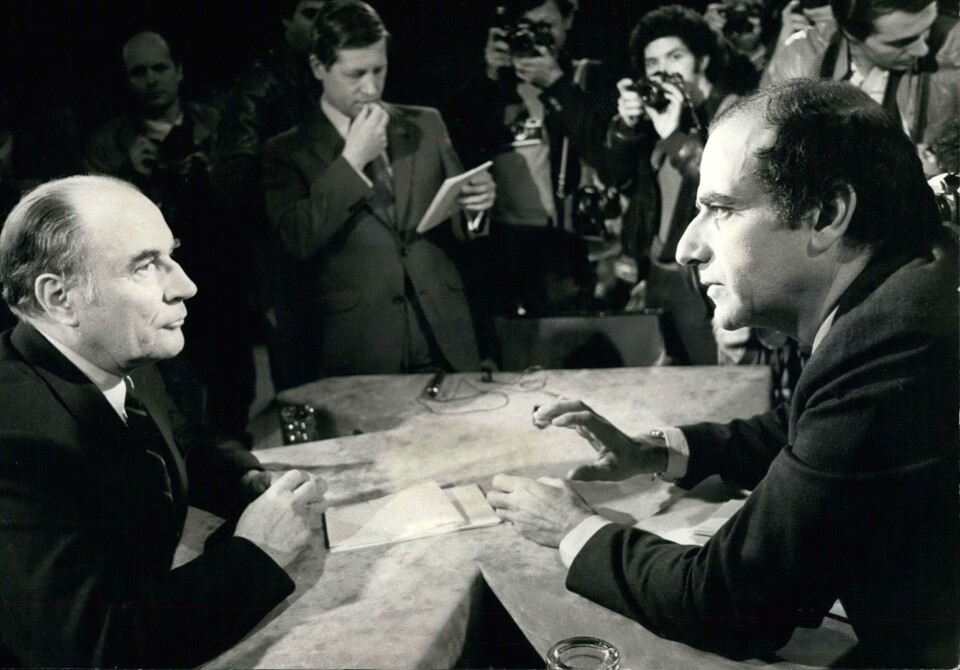-
La Voie Bleue: European Cycle Route of the Year is in France
700km bike path linking Luxembourg and Lyon has been crowned winner of the 2026 title
-
Before and after: Garonne river floods in south-west France
Satellite images show extent of flooding from back-to-back storms in February
-
Home insurance increases expected in France after floods
Compensation costs for the recent storms and flooding across the west and south-west is estimated to be in the billions of euros
French journalist who interviewed every president since de Gaulle dies
Jean-Pierre Elkabbach was known in recent years for his use of a killer question to open an interview. His career in TV and radio spanned 60 years

Jean-Pierre Elkabbach, one of France’s most long-standing and respected journalists who was known for his witty political interviews over a 60-year career, died yesterday (October 3) aged 86.
Mr Elkabbach worked across many of France’s most known radio and TV channels, and was propelled by endless curiosity and a fascination with power.
He was the news anchor of France 2’s Journal Télévisé (nicknamed ‘le JT’) in the 1970s, and interviewed every president from Charles De Gaulle to Emmanuel Macron. He also interviewed countless French politicians and some from overseas too, including Margaret Thatcher and Vladimir Putin.
One of his most memorable moments was his TV interview of socialist president François Mitterrand in 1994, and his later sparring matches with former Communist Party leader Georges Marchais.
He was known over the last decade for his interview-opening punchlines with one to the leader of the Rassemblement National (formerly the Front national) Marine Le Pen (see below) being a classic example.
President Macron paid tribute after news broke of his death, calling him “a behemoth of French journalism”. Other living French presidents, politicians, and journalists have also shared their memories.
“Passionate about politics, always hungry for information, a pugnacious interviewer with no concession, visionary and demanding media director, his style inspired a whole generation,” said former French president Nicolas Sarkozy.
“He was a fellow traveller of France’s Fifth Republic,” said the Communist Party leader Fabien Roussel.
“He reported on politics and the 20th century like no one else, and brought public debate into every household,” said Delphine Ernotte, general director of France Télévisions, one of several media companies for which Mr Elkabbach once held the presidency.
Close observer of French politics
Mr Elkabbach started his career in his native Morocco in the 1960s before becoming a correspondent in France.
He became a familiar face and voice of the French people during the 1970s, after he worked successively for the French channel Antenne 2 - now France 2 - and on the radio station France Inter.
Mr Elkabbach co-anchored the Cartes sur table programme from 1977 to 1981, a show that interviewed political figures - including Prime Minister Margaret Thatcher on March 10, 1980.
Many French people of the right age may hold memories from that programme, including confrontations with Mr Marchais, who was a truculent politician with a knack for good puns and witty answers.
Mr Elkabbach was also one of the journalists who announced the victory of François Mitterrand in 1981 on Antenne 2. He would later be fired from the channel due to links with runner-up Valéry Giscard d’Estaing.
Europe 1 and France Télévisions years
“Europe 1 was a second home to him; it’s where he was the happiest, I think,” said politician Julien Dray this morning on Europe 1, as the radio is paying tribute to one of its most well-known figures.
Mr Elkabbach was hired to work on Europe 1 in 1982 and ran the station as deputy managing editor until 1991, before he became president of France Télévisions in 1993.
The highlight of his career remains his interview of François Mitterrand following revelations in a book of his past and role in Vichy France.
Mr Elkabbach was a savvy connoisseur of the French media landscape, having worked across many different French radios and TV stations, including moving backwards and forwards across jobs.
He pursued a career on the TV channel Public Sénat from 2000 to 2009, and joined Europe 1 again in 2005 before leaving in 2016 to continue on TV channel CNews until 2021, when he rejoined - once again - Europe 1.
Modern punchline journalist
But one of his most memorable and powerful attributes was his ability to change with the times.
From the polite interviews of the 90s - which saw politicians and journalists listening to each other and answering with sometimes-minutes-long explanations - Mr Elkabbach later morphed into a journalist who adapted to the faster-paced modern reporting style.
The new age of modern journalism liked punchlines and soundbites; and provocative, suggestive or shocking ‘petites phrases’ (little remarks). Newer generations knew Mr Elkabbach for a tendency to open interviews with unexpected questions.
For example, he started an interview with Ms Le Pen in 2015 by asking: “Ms Le Pen, are you not ashamed?”. A befuddled Ms Le Pen answered back, spluttering: “I’m sorry? Ashamed about what?”
Mr Elkabbach’s point was to highlight her party’s absence at a march in support of the victims of the 2015 Paris terrorist attacks.
In another example, he started an interview with André Vallini, the then-minister for territorial reform - who was speaking to Europe 1 on May 13, 2014, to defend one of his reforms - asking: “Which colour would you prefer for the wall?”
Mr Vallini replied: “The wall? What wall?” before Mr Elkabbach said: “The wall your territorial reform is going to crash into.”
Related article
Why are newspapers known as canards (ducks) in French?
Macron: limiting president to two consecutive mandates is ‘stupidity’s
























